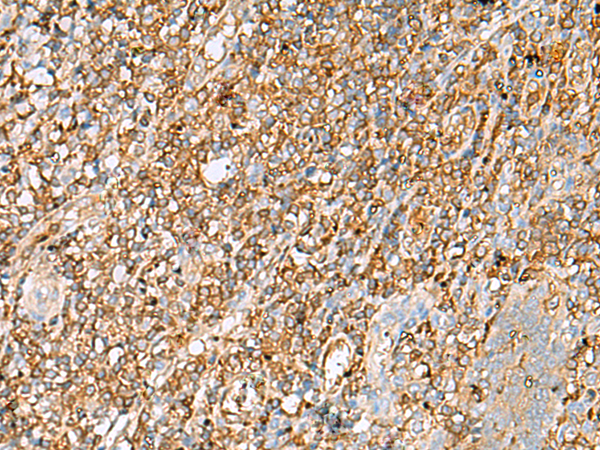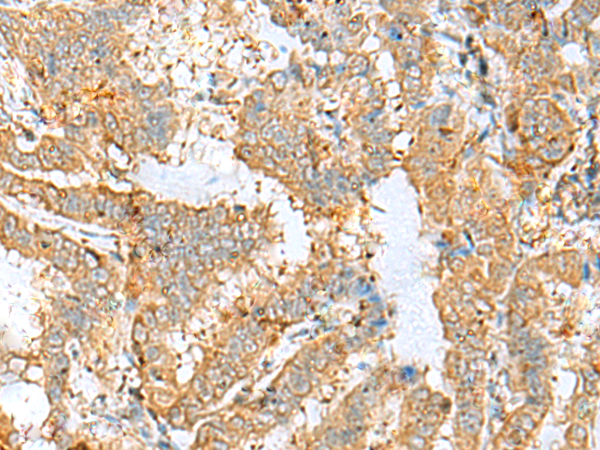


| WB | 咨询技术 | Human,Mouse,Rat |
| IF | 咨询技术 | Human,Mouse,Rat |
| IHC | 1/50-1/100 | Human,Mouse,Rat |
| ICC | 技术咨询 | Human,Mouse,Rat |
| FCM | 咨询技术 | Human,Mouse,Rat |
| Elisa | 1/5000-1/10000 | Human,Mouse,Rat |
| Aliases | HUAT; LGALS9A |
| WB Predicted band size | 40 kDa |
| Host/Isotype | Rabbit IgG |
| Antibody Type | Primary antibody |
| Storage | Store at 4°C short term. Aliquot and store at -20°C long term. Avoid freeze/thaw cycles. |
| Species Reactivity | Human, Mouse, Rat |
| Immunogen | Synthetic peptide of human LGALS9 |
| Formulation | Purified antibody in PBS with 0.05% sodium azide and 50% glycerol. |
+ +
以下是关于LGALS9(galectin-9)抗体的3篇参考文献,内容概括基于研究摘要:
1. **文献名称**: *Galectin-9 in cancer therapy*
**作者**: Zhu C. et al.
**摘要**: 该研究探讨了抗LGALS9抗体在调节肿瘤微环境中的作用,发现其通过阻断T细胞耗竭相关通路增强抗肿瘤免疫反应,为癌症免疫治疗提供了新策略。
2. **文献名称**: *Galectin-9 signaling drives autoimmunity in patients with rheumatoid arthritis*
**作者**: Seki M. et al.
**摘要**: 研究利用抗LGALS9抗体抑制实验,证明Galectin-9通过激活促炎性T细胞加剧类风湿性关节炎进展,提示靶向LGALS9可能成为自身免疫疾病的潜在疗法。
3. **文献名称**: *Antibody-mediated blockade of galectin-9 enhances antiviral immunity in chronic viral infection*
**作者**: Wherry E.J. et al.
**摘要**: 在慢性病毒感染模型中,抗LGALS9抗体治疗恢复耗竭T细胞功能,降低病毒载量,表明Galectin-9是免疫检查点调控的关键靶点。
以上文献均聚焦于LGALS9抗体的治疗潜力及机制研究,涵盖癌症、自身免疫病和病毒感染领域。如需具体期刊信息或发表年份,可进一步补充检索条件。
LGALS9 (Galectin-9) is a member of the galectin family, a group of β-galactoside-binding lectins involved in immune regulation, inflammation, and cancer progression. Structurally, LGALS9 contains two carbohydrate recognition domains (CRDs) connected by a linker peptide, enabling interactions with various glycoproteins. It is broadly expressed in immune cells (e.g., T cells, dendritic cells), endothelial cells, and epithelial tissues. Functionally, LGALS9 acts as a ligand for TIM-3 (T-cell immunoglobulin and mucin domain-containing protein 3), a co-inhibitory receptor on T cells and innate immune cells, playing a key role in modulating immune tolerance, T-cell exhaustion, and tumor immune evasion. Dysregulated LGALS9 expression is linked to autoimmune diseases, chronic infections, and cancer.
LGALS9 antibodies are tools or therapeutics designed to target LGALS9 or its signaling pathways. Monoclonal or polyclonal antibodies against LGALS9 are used experimentally to block its interaction with TIM-3. thereby reactivating T-cell responses in cancer models or mitigating immune suppression. In research, these antibodies help elucidate LGALS9's role in diseases like HIV, hepatitis, and multiple sclerosis. Therapeutically, anti-LGALS9 antibodies are under investigation to enhance anti-tumor immunity, particularly in combination with checkpoint inhibitors (e.g., anti-PD-1). Challenges include balancing efficacy with potential autoimmune side effects. Overall, LGALS9 antibodies represent a promising avenue for modulating immune responses in oncology and inflammatory disorders.
×